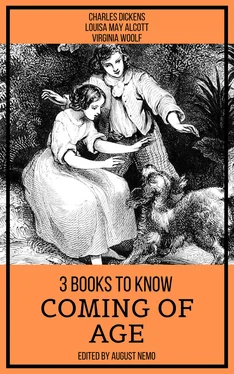If my time had run out, it would have left me still at the height of my perplexities, I dare say. It never did run out, however, but was brought to a premature end, as I proceed to relate.

It was in the fourth year of my apprenticeship to Joe, and it was a Saturday night. There was a group assembled round the fire at the Three Jolly Bargemen, attentive to Mr. Wopsle as he read the newspaper aloud. Of that group I was one.
A highly popular murder had been committed, and Mr. Wopsle was imbrued in blood to the eyebrows. He gloated over every abhorrent adjective in the description, and identified himself with every witness at the Inquest. He faintly moaned, "I am done for," as the victim, and he barbarously bellowed, "I'll serve you out," as the murderer. He gave the medical testimony, in pointed imitation of our local practitioner; and he piped and shook, as the aged turnpike-keeper who had heard blows, to an extent so very paralytic as to suggest a doubt regarding the mental competency of that witness. The coroner, in Mr. Wopsle's hands, became Timon of Athens; the beadle, Coriolanus. He enjoyed himself thoroughly, and we all enjoyed ourselves, and were delightfully comfortable. In this cozy state of mind we came to the verdict Wilful Murder.
Then, and not sooner, I became aware of a strange gentleman leaning over the back of the settle opposite me, looking on. There was an expression of contempt on his face, and he bit the side of a great forefinger as he watched the group of faces.
"Well!" said the stranger to Mr. Wopsle, when the reading was done, "you have settled it all to your own satisfaction, I have no doubt?"
Everybody started and looked up, as if it were the murderer. He looked at everybody coldly and sarcastically.
"Guilty, of course?" said he. "Out with it. Come!"
"Sir," returned Mr. Wopsle, "without having the honour of your acquaintance, I do say Guilty." Upon this, we all took courage to unite in a confirmatory murmur.
"I know you do," said the stranger; "I knew you would. I told you so. But now I'll ask you a question. Do you know, or do you not know, that the law of England supposes every man to be innocent, until he is proved—proved—to be guilty?"
"Sir," Mr. Wopsle began to reply, "as an Englishman myself, I—"
"Come!" said the stranger, biting his forefinger at him. "Don't evade the question. Either you know it, or you don't know it. Which is it to be?"
He stood with his head on one side and himself on one side, in a bullying interrogative manner, and he threw his forefinger at Mr. Wopsle—as it were to mark him out—before biting it again.
"Now!" said he. "Do you know it, or don't you know it?"
"Certainly I know it," replied Mr. Wopsle.
"Certainly you know it. Then why didn't you say so at first? Now, I'll ask you another question;" taking possession of Mr. Wopsle, as if he had a right to him. "Do you know that none of these witnesses have yet been cross-examined?"
Mr. Wopsle was beginning, "I can only say—" when the stranger stopped him.
"What? You won't answer the question, yes or no? Now, I'll try you again." Throwing his finger at him again. "Attend to me. Are you aware, or are you not aware, that none of these witnesses have yet been cross-examined? Come, I only want one word from you. Yes, or no?"
Mr. Wopsle hesitated, and we all began to conceive rather a poor opinion of him.
"Come!" said the stranger, "I'll help you. You don't deserve help, but I'll help you. Look at that paper you hold in your hand. What is it?"
"What is it?" repeated Mr. Wopsle, eyeing it, much at a loss.
"Is it," pursued the stranger in his most sarcastic and suspicious manner, "the printed paper you have just been reading from?"
"Undoubtedly."
"Undoubtedly. Now, turn to that paper, and tell me whether it distinctly states that the prisoner expressly said that his legal advisers instructed him altogether to reserve his defence?"
"I read that just now," Mr. Wopsle pleaded.
"Never mind what you read just now, sir; I don't ask you what you read just now. You may read the Lord's Prayer backwards, if you like—and, perhaps, have done it before to-day. Turn to the paper. No, no, no my friend; not to the top of the column; you know better than that; to the bottom, to the bottom." (We all began to think Mr. Wopsle full of subterfuge.) "Well? Have you found it?"
"Here it is," said Mr. Wopsle.
"Now, follow that passage with your eye, and tell me whether it distinctly states that the prisoner expressly said that he was instructed by his legal advisers wholly to reserve his defence? Come! Do you make that of it?"
Mr. Wopsle answered, "Those are not the exact words."
"Not the exact words!" repeated the gentleman, bitterly. "Is that the exact substance?"
"Yes," said Mr. Wopsle.
"Yes," repeated the stranger, looking round at the rest of the company with his right hand extended towards the witness, Wopsle. "And now I ask you what you say to the conscience of that man who, with that passage before his eyes, can lay his head upon his pillow after having pronounced a fellow-creature guilty, unheard?"
We all began to suspect that Mr. Wopsle was not the man we had thought him, and that he was beginning to be found out.
"And that same man, remember," pursued the gentleman, throwing his finger at Mr. Wopsle heavily; "that same man might be summoned as a juryman upon this very trial, and, having thus deeply committed himself, might return to the bosom of his family and lay his head upon his pillow, after deliberately swearing that he would well and truly try the issue joined between Our Sovereign Lord the King and the prisoner at the bar, and would a true verdict give according to the evidence, so help him GOD!"
We were all deeply persuaded that the unfortunate Wopsle had gone too far, and had better stop in his reckless career while there was yet time.
The strange gentleman, with an air of authority not to be disputed, and with a manner expressive of knowing something secret about every one of us that would effectually do for each individual if he chose to disclose it, left the back of the settle, and came into the space between the two settles, in front of the fire, where he remained standing: his left hand in his pocket, and he biting the forefinger of his right.
"From information I have received," said he, looking round at us as we all quailed before him, "I have reason to believe there is a blacksmith among you, by name Joseph—or Joe—Gargery. Which is the man?"
"Here is the man," said Joe.
The strange gentleman beckoned him out of his place, and Joe went.
"You have an apprentice," pursued the stranger, "commonly known as Pip? Is he here?"
"I am here!" I cried.
The stranger did not recognize me, but I recognized him as the gentleman I had met on the stairs, on the occasion of my second visit to Miss Havisham. I had known him the moment I saw him looking over the settle, and now that I stood confronting him with his hand upon my shoulder, I checked off again in detail, his large head, his dark complexion, his deep-set eyes, his bushy black eyebrows, his large watch-chain, his strong black dots of beard and whisker, and even the smell of scented soap on his great hand.
"I wish to have a private conference with you two," said he, when he had surveyed me at his leisure. "It will take a little time. Perhaps we had better go to your place of residence. I prefer not to anticipate my communication here; you will impart as much or as little of it as you please to your friends afterwards; I have nothing to do with that."
Читать дальше















